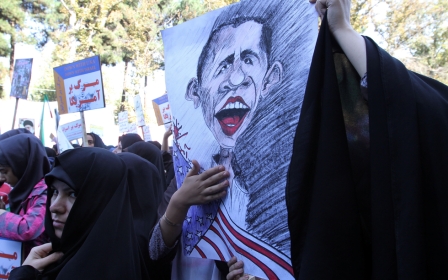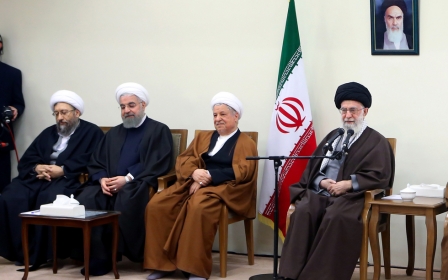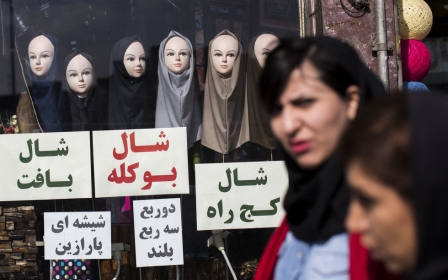US, UK and Israel still Iran's 'main enemies': Khamenei

Iran's supreme leader Ayatollah Ali Khamenei hit out at the United States, Britain and Israel on Friday in a speech marking the 27th anniversary of the death of his revolutionary predecessor Ayatollah Ruhollah Khomeini, describing the three countries as Tehran's "main enemies".
Khamenei also accused Washington of procrastinating and breaking promises related to the landmark nuclear deal that came into force in January, easing sanctions against Iran in return for restrictions on its nuclear activities.
"It's the US, the evil Britain, and the damned and cancerous Zionist regime. These are the main enemies," Khamenei said.
"We sat down and negotiated with the P5+1 group and even separately with the Americans over the nuclear issue," he said, referring to the group of China, Russia, the UK, the US, France and Germany with whom Iran negotiated the deal, during a televised speech to thousands gathered at Khomeini's extravagant mausoleum in southern Tehran.
"The other side, the Americans, made some commitments. The Islamic republic completed its commitments but the other unfaithful side is procrastinating."
"Whoever trusts in the United States is committing a big mistake and will be hit with a slap," he added.
Khamenei's address was met with chants from the crowd of "Death to America", a common cry during his anti-Western speeches.
Khomeini 'reached out to Washington'
It also coincided with revelations, published on Friday on the BBC website, suggesting that Khomeini, who swept to power following the ousting in 1979 of the US-backed Shah Reza Pahlavi, reached out to US President Jimmy Carter in the early days of the Iranian revolution to reassure him that he did not consider Washington to be an enemy.
"You will see we are not in any particular animosity with the Americans," Khomeini wrote in newly released declassified US diplomatic documents, also pledging that his proposed Islamic republic would be "a humanitarian one, which will benefit the cause of peace and tranquillity for all mankind".
According to the BBC, the documents were the result of a two-week period of dialogue between Khomeini's chief of staff and a US government official in Paris that helped clear the way for Khomeini to return to Iran from exile in France.
They also offer a different perspective to the traditional Iranian account of the revolution in which Khomeini and his supporters defied US-led efforts to keep the Shah in power and denounced Washington as the "Great Satan".
Washington and Tehran have been considered antagonists ever since the revolution, but January's nuclear deal was interpreted by many as a sign of rapprochement, with the US, the UN and the EU all lifting sanctions against Iran relating specifically to its nuclear programme.
But the US and EU have retained sanctions related to Iran's missile programme, its human rights situation and support for groups like Hezbollah, which Washington categorises as a "terrorist" organisation.
Negotiations 'impossible'
Khamenei said it was "impossible" that Iran would enter into negotiations with the US over such issues.
"First they enter with a smile and (soft) language but later in practice they will not do what they should do and will not keep their commitment," he said.
Iran accuses US President Barack Obama's administration of not taking the required steps to reassure big international banks who are reluctant to do business with Iran for fear of punitive measures.
More than a decade of nuclear-related sanctions hampered Tehran's economy.
Iranian President Hassan Rouhani told Tehran's newly elected parliament last week that Iran needs $30bn-50bn each year in foreign investment to hit its 8 percent growth target.
Khamenei went on to emphasise the importance of a domestic "resistance economy", rather than reliance on foreign investment.
"To think that the economic boom of the country can be merely reached through foreign investment is a mistake," he said.
"More important than foreign investment is activating domestic potential. For a country to integrate its economy into the world economy is not an honour, it's a loss and defeat."
New MEE newsletter: Jerusalem Dispatch
Sign up to get the latest insights and analysis on Israel-Palestine, alongside Turkey Unpacked and other MEE newsletters
Middle East Eye delivers independent and unrivalled coverage and analysis of the Middle East, North Africa and beyond. To learn more about republishing this content and the associated fees, please fill out this form. More about MEE can be found here.




